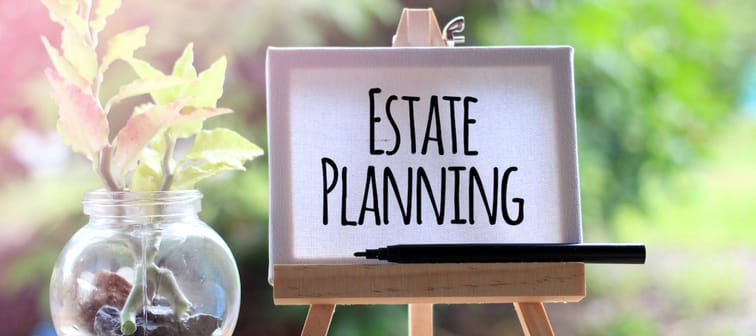What is estate planning?
Estate planning is the process of pre-arranging how your finances and other assets will be used or managed when you die or become incapacitated. Estate planning can include creating a will, power of attorney, living will and trusts; choosing an executor or trustee; purchasing life insurance; naming a guardian for minor children, and even outlining details about how you’d like to be laid to rest.
Why should you plan your estate?
In the same way that a financial plan can help you map out a path to your financial goals, an estate plan can ensure your final financial objectives—namely a timely and tax-efficient transfer of assets to your loved ones—are achieved.
Here are a few more specific reasons why you should plan your estate:
- You get to choose your heirs. If you die without a will (called dying “intestate”), there’s no telling who will receive your assets as it’s up to the courts to decide. Even worse, if you have kids and both you and the other parent die while they are minors (under age 18), the court will name a guardian for them.
- You make things easier on your loved ones. A proper estate plan will not only put your assets in the hands of your heirs as quickly as possible but will also help them make important decisions about your finances and care if you are ill and can’t do so yourself.
- You can implement tax-saving strategies. By planning ahead you may be able to avoid some taxes on your estate through the use of trusts and other tools. Life insurance death benefits, for example, are paid out to beneficiaries tax-free.
How to develop an estate plan
Estate planning in Canada is a multi-step process that may involve consultation with various experts—such as legal, tax and insurance professionals—who can help you prepare the required documents and point out various Canadian estate planning strategies to best serve your needs.
Depending on the complexity of your estate and your family situation, you may be able to handle some or all of the estate planning process on your own or with the help of online services. They will walk you through the process of creating a legal will online. But whether you reach out to the pros or not, these are the estate planning tasks you’ll need to complete:
- Take stock of your assets. This includes all your cash assets (bank accounts, investments, TFSAs or RRSPs, and any other registered accounts) as well as insurance policies and non-cash assets (a business, home or other real estate holdings, motor vehicle, jewelry, collections of value, heirlooms, etc.).
- Decide who should receive your assets, and when. In some cases, this can be a very straightforward decision. If you’re married with no children, for example, you might want all your assets to go directly to your spouse when you die. If, on the other hand, you’re divorced with kids, you’ll have to decide if you want your children to receive your assets right away, when they come of age, or a bit of both—which can be accomplished by creating a trust, as we’ll explain later on. There may be other individuals or organizations to whom you want to leave some of your assets or specific items that you want to bequest as gifts.
- Choose guardian(s). If you have minor children, this is who will take legal, moral and financial responsibility for them if you and your spouse pass away. You should also select someone to take care of any pets you have.
- Select the individuals who you want to carry out your plans. This includes choosing an executor, who must file your final tax return and make sure your heirs receive their inheritances; naming powers of attorney, who will make financial or health decisions on your behalf if you are unable to do so; and appointing a trustee, if applicable, who will administer any assets you put in a trust according to your wishes.
Critical components of an estate plan
A thorough estate plan consists of several parts, including legal documents and financial instruments. Here’s an overview of the key components you should have in your estate plan.
Legal will
A will is a legal document in your estate plan that spells out who should receive your assets (your beneficiaries) and how those assets will be divided among those beneficiaries. It also names your executor and guardians for minor children (if applicable).
For a will to be legal in Canada, it must be:
- written by an adult of sound mind;
- a paper document signed in ink by the will’s author (called the testator);
- witnessed and signed by two people who will not benefit from the testator’s estate.
There are various ways to make a legal will, and each comes with its own pros and cons.
A holograph will, for example, is one that you write by hand yourself. (This type of will does not require the signatures of witnesses, since the entire document is in the testator’s handwriting.) While you can prepare a holograph will for free (a pro), it’s unlikely you’ll know what to include or how to word it, which could create problems for your heirs down the road (a major con).
Similarly, do-it-yourself will kits are a low-cost ($40 or less) option that uses fill-in-the-blank templates. Much of the wording is provided in these kits (a pro), but you still need to be comfortable with legalese as it does not include any guidance or explanation, and there is no easy way to update or customize your will (cons).
For most people, there are really only two viable methods for preparing a will:
- Use an online service. There are websites to guide you through the process of creating a will online. This can be a cost-effective option for those with simple estates and family arrangements. A reputable online will platform will ask you questions about your situation and assets to prepare a will that meets your specific needs at an affordable rate. You can do the whole thing from home in about 20 minutes, and you’re able to change or update your will as needed (for example, following a marriage, divorce or birth of a child). Once you print out the document and sign it (in the presence of two witnesses who will not benefit from your estate), the will is legally binding. (During the COVID-19 lockdowns, Willful has partnered with Notary Pro to help customers in some provinces get their wills witnessed virtually.)
- Hire an estate lawyer. While a lawyer will charge you hundreds of dollars to prepare your will, that can be money well spent when you have a complex estate. That’s because a lawyer may be able to help your heirs avoid or mitigate estate taxes by using various tools, such as trusts, which are not available through an online will service. Certainly, anyone with a high net worth, investment properties/vacation homes (which are taxed differently than a primary residence at death) or a large business should consult a lawyer. Even if you don’t have a large estate, but you have complicated needs as to when and how your assets will be divided (because of a blended family, for example), it’s usually wise to consult a lawyer.
Trusts
A trust is a financial instrument that holds assets you want to give to someone else and sets out conditions for when and how those assets will be transferred. A third-party trustee (that you name) is responsible for managing and administering the assets held in the trust.
There are living trusts, which are used to give assets to your beneficiaries while you’re still alive, and testamentary trusts that only come into effect once you die. Both can be used for estate planning purposes.
If, for example, one of your heirs receives disability supports, you might create a testamentary trust to administer a series of small annual payouts to them after you die, rather than a single lump-sum inheritance that could disqualify them from receiving benefits, which are calculated based on annual income. Similarly, a testamentary trust may be used to provide an income to a current spouse for as long as he or she lives, with any remaining assets in the trust then going to your children from a previous marriage.
Living trusts are commonly used to transfer ownership of real estate, such as a cottage or rental property, as any assets held in such a trust are not included in the value of your estate when calculating probate taxes.
Power of attorney
A power of attorney is a legal document that names a specific person to act on your behalf if you become incapacitated due to an accident or illness. Without this document, no one will be able to manage or access your assets for you during your period of incapacitation. Many online will services offer an option to draft a power of attorney, as well as a living will, which provides instructions as to your preferred end-of-life care.
Insurance
As you go through the estate planning process and consider the many tax implications (which we’ll get to below), you might realize that your estate won’t provide enough for your loved ones to manage after you’re gone, especially if you have dependents. That’s where life insurance comes in. Any personal or workplace life insurance coverage you have will provide a tax-free lump sum to your beneficiaries when you die.
By taking a proactive approach to estate planning while you’re young, you have the option of implementing one of the best Canadian estate planning strategies—purchasing life insurance coverage—at much better rates than you’ll get when you’re older. Use an online search platform to compare rates from the top life insurance companies in Canada.
Taxation and estate planning
There are two types of taxes that a deceased’s estate must pay before the remaining assets go to the beneficiaries: probate taxes and income taxes.
Probate taxes
Think of this as an estate administration fee. It is about 1.5% of the entire value of the estate. So, for example, if you are unmarried and leave behind a principal residence worth $750,000, $150,000 in RRSPs, $65,000 in TFSAs and $35,000 in cash or other assets, the total value of your estate would be $1 million, and the probate taxes would be about $15,000.
Income taxes
Your appointed executor is responsible for filing your final income tax return after you die. But this can include a great deal more than your regular earnings up until the time of your death. In the estate described above, for example, the $150,000 in RRSPs would be collapsed and added as income to the estate, as would any interest income on the $35,000 cash. The TFSA is not taxable income (remember, all withdrawals from a TFSA are tax-free), and the home does not trigger any taxable earnings because of the capital gains tax exemption on a primary residence.
In this situation, total income for the year could exceed $225,000, which in Ontario is in the highest tax bracket, resulting in income taxes of about $80,000 or more. Other types of investments and assets, such as a business or vacation property, would boost a deceased’s income—and their final tax bill—even further.
A tax advisor or estate planning specialist can help you come up with strategies to reduce the tax hit on your estate to leave more for your heirs. Assets in a trust, for example, bypass probate taxes, while properties that are jointly owned with a spouse pass directly to them rather than going through the estate.
Bottom line
Estate planning may not be the most enjoyable task—nearly one-quarter (24%) of Canadians would even rather clean their bathroom, a survey found—but it is an essential one, especially for those who have young children.
So, don’t put it off any longer. Look into online providers, such as Willful, that can help you draft a legal will and power of attorney, and make use of digital platforms to compare the best rates on life insurance in Canada. By planning ahead while you’re young, you’ll also have more opportunities to implement tax-efficient Canadian estate planning strategies.







